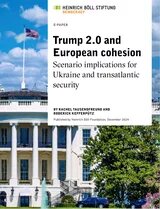There has been extensive commentary of 2024 having been an ‘election super-year’. Elections were held in over 70 countries, with over half the global population going to the polls. This report assesses the outcomes of these elections. Self-evidently, it can paint only a very broad-brush picture and deliberately avoids going into the detail of electoral contests in any particular country. The report offers reflections on what the impact of the election super-year is likely to be on key policy issues, and also on the deeper systemic state of democracy. It does this by suggesting eight cross-cutting lessons that emerged from the plethora of national elections held in 2024.

Summary of key results
The most common narrative about the election super-year has been that incumbent parties and leaders got a drubbing at most polls. A common thread running through the different elections was a turn against incumbents. Such turns are not uncommon, of course, but in 2024, they were especially sharp and numerous. There is widespread agreement that this reflects extremely high levels of general citizen frustration with all governments, across vastly different types of political regimes.
Despite this being a clear and powerful outcome from the year, it is a narrative that should not be taken too far. There was largely unremarked continuity as well as change. Not all election outcomes were highly dramatic. While most ruling parties’ share of the vote declined, some ruling parties and coalitions did well enough to retain power – even if with smaller majorities. This was the case in Czechia, Croatia, the Dominican Republic, Ireland, the Maldives, Moldova, Mongolia, Lithuania and the Solomon Islands.
Another prominent narrative has been about the radical-right surge, especially in Europe. This is indeed a sobering concern to emerge from the election super-year, and yet overall ideological trends were mixed. Some countries turned right: examples include Panama, Portugal and North Macedonia. Some turned to the left: Lithuania, South Korea, Mauritius, the UK and Uruguay, for instance. And some elections generated outcomes that were not at all clear, leaving instability and uncertainty in their wake rather than any definitive ideological redirection: Bulgaria, France and Japan fit into this category.
A key debate during the year was how far rightward turns extended towards the far right or radical right – that is, towards extreme positions that might endanger core democratic and liberal values in established democracies. This was of concern not only in the obvious case of the US presidential election but in several European elections. Radical-right parties either won or performed strongly in several countries, including Austria, Portugal and Romania. Yet, at year’s end, opinion differed strongly over how much of a danger this would pose to democracy in the future (more on this below).
Measured by the standard indicators of democracy, electoral processes also invited a range of assessments. In a small number of countries, elections gave democracy a clear boost. In Senegal, the opposition won and took power after the incumbent president tried to stop this from happening and suggested he might hang onto power illegally. In Botswana, the long-time ruling party conceded defeat and handed power peacefully to opposition forces. Sri Lanka successfully held its first democratic elections since protests ousted the president in 2022, a significant step forward in the country’s redemocratisation.
In some democracies, the playing field for elections was not entirely level and this helped incumbents retain power – yet with opposition parties doing better than expected and more intense competition than most had predicted. In India, Prime Minister Modi lost his majority, as did the African National Congress in South Africa. Such outcomes offered signs of some pushback against democratic backsliding, even if not strong enough to mark any decisive turnaround.
In many autocracies, elections were, unsurprisingly, pure charades with virtually no contestation or criticism allowed against ruling regimes, who easily retained power. This was the case in Azerbaijan, Belarus, Chad, El Salvador, Russia, Rwanda, Syria and Uzbekistan. The same was true in Togo, with the added manipulation of the president cancelling direct presidential elections to get round the presidential term limit and continue ruling through a new parliamentary majority.
In another category of outcome, incumbent governments’ efforts to rig elections were not fully watertight and triggered varying degrees of criticism and pushback. This was a category where rigging was more contested, as was the case in Algeria, Comoros, Madagascar, Mauritania, Mozambique, Namibia, Venezuela, Georgia and Tunisia. In some of these places, externally orchestrated disinformation was a factor (like Georgia), although the dynamics were rooted deep in domestic political features. In these cases, elections solidified authoritarian power but also acted as a catalyst for democratic mobilisation that carried on into the post-election period. In Bangladesh, this post-election anger was strong enough to eventually push the government of Prime Minister Sheikh Hassina out of power.
Other countries produced distinctive variants of autocratising regimes ensuring controlled continuity. In Pakistan, the military rigged elections in favour of the government; this did not prevent the opposition from winning, but the military then concocted a coalition that kept it out of power. Indonesia saw the illiberal-populist government continue, with the victory of Prabowo Subianto – outgoing President Widodo’s anointed successor – after an election marred by irregularities. Likewise, Mexico got a new president, Claudia Sheinbaum, albeit from the incumbent party and handpicked by outgoing President Obrador.
Some elections in the Middle East and North Africa allowed for a degree of genuine competition, but within political systems that accord elected leaders and parliaments relatively limited power. These might be termed elections with curtailed impact. In Kuwait, the opposition retained its majority in parliament, but the emir then suspended that new parliament. In Jordan, the Islamic Action Front (the local version of the Muslim Brotherhood) won legislative elections, but the king tightened his power over key decision-making. Iran’s elections gave victory to a slightly more moderate candidate for president, but within a context of the conservative religious establishment retaining de facto control.
As a unique and distinctive election beyond the nation-state, the 2024 European Union parliamentary elections on 6–9 June represented a significant test for the EU’s democratic resilience. While far-right parties made notable gains, especially in countries like France, Austria and Italy, the feared far-right surge was not strong enough to lead to a dramatic collapse of pro-EU forces. Still, far-right parties managed to increase their presence and influence in the European Parliament. Opinions remain divided on how far the incorporation of (some parts of) the radical right into mainstream EU politics will erode European democracy in the long run. At the operational level, the 2024 EU elections garnered a high turnout of 51 per cent, representing a slight increase from the last European elections, and counter-disinformation initiatives worked reasonably well.
Cross-cutting themes
From these varied developments and features of the 2024 elections, a number of reflections suggest themselves. These relate to policy implications and deeper democratic trends; they also question some commonly held views about the election super-year.
1. The underlining question was whether the elections were on balance good or bad for democracy. Interestingly, most views on this have tended toward a negative assessment. Many observers group the swing against incumbents and the rise of illiberal parties to conclude that 2024 has put democracy under even more intense strain. The V-Dem 2024 annual report stressed how election manipulation has becoming a leading element of autocratisation. Despite much dramatic concern that democracy would emerge seriously damaged from the election super-year, most elections did not in fact have any major or decisive systemic implications, either good or bad, for democracy. Overall, as Thomas Carothers concludes: ‘The year of elections can be understood as a telling reflection of the overall uncertain direction of travel of the global state of democracy.’
2. The rise in extremism through the election super-year was a concern, but it is important not to overstate this. In democracies, most elections were fairly routine affairs. The fears over the far right were well grounded, but these parties mostly gained ground incrementally and remained well short of affecting any systemic shake-up – that is, their impact on the polity was less dramatic than on particular policies. Some parties at the extremes of the ideological spectrum did well, in all regions, and yet overall there was no mass, uniform swing to the extremes, as many had feared or as many media headlines had implied.
3. Did the elections tell us anything clear about the depth and legitimacy of voting and political engagement per se? Some turnouts were low compared to previous elections – such as in the UK. But many of this year’s elections saw high turnouts, even the highest for many decades, such as in France, for example. The election super-year did not, contrary to much speculation, reflect or crystallise a massive swing away from voters’ faith in elections or citizen disillusionment with voting. In countries with hybrid regimes, the problem was the lack of a level playing field for electoral competition, not any lack of popular desire to vote.
4. A running fear was that elections would be distorted by social media and disinformation. The common argument was that the harmful impact of social media was a large part of the explanation for most ruling parties getting defeated or losing support. To some extent, this was indeed the case: Romania was a dramatic example at the end of the year. But in others, clear progress was registered in counter-disinformation resilience. This was seen in Taiwan, especially, where robust cyber defence helped ensure that the Democratic Progressive Party retained the presidency against the more China-friendly Nationalist Party (or Kuomintang). As mentioned above, the EU elections were fairly robust in this sense too.
5. A popular narrative of the super-year holds that electoral dynamics have been overwhelmingly negative as voters’ choices have been increasingly influenced by a ‘psychology of fear’. Some experts have argued that the elections highlight that voters are generally fed up with politics and politicians, voting negatively against those parties they dislike rather than out of any positive attachment to their chosen party or candidate. It has been asserted that the elections have been mainly about citizens signalling displeasure and fear. This is a simple and straightforward reading that has been easily picked up and popularised by the media. Even if it contains a core of truth, however, the variation in electoral outcomes suggests this reading is somewhat simplistic. There are too many differences and factors at play across countries – institutional structures, regime types, economic situations and culture – to reduce the election super-year to this kind of blanket storyline. In some instances, voters have clearly been motivated by more positive aspirations and engaged more constructively in developing political alternatives than this psychology-rooted account allows for – places like Botswana, Sri Lanka and Uruguay, for example, invited this conclusion.
6. The impact of the election super-year on climate policy is concerning, but probably not as far-reaching as could have been the case. A common view is that most elections in 2024 foregrounded citizen concerns over the cost-of-living crisis and crowded climate change off the agenda. While this view has much truth to it, overall the impact of election super-year on climate action looks mixed. Some outcomes are clearly bad for climate action, most notably in the US and Indonesia (the latter on critical mineral mining and biofuel deforestation especially). Others may prove more positive: Mexico and the UK, for example. European election results have undoubtedly put more critical pressure on climate change commitments; yet they have led mainly to calls for socially fairer climate transition rather than for a complete backtrack, even if some of the far-right parties that gained in elections do have more radical anti-climate positions and the risk of far-reaching greenlash certainly exists. The picture is complex as some far-right parties that have done well in 2024’s elections support a back-to-the-soil environmental kind of conservatism.
7. Foreign policy implications for the EU are likely not as game-changing as many predicted. Autocratic leaders that retained power were those both hostile and friendly to the EU and Member State governments, with little change in security alliance structures due to the elections as such. The change of US administration may, of course, prove more challenging for European interests. The more contested rigged elections represent a diplomatic headache for the EU; the Union has been critical of election irregularities in these cases (like Georgia, Mozambique, Serbia and Venezuela), yet in most of them without breaking off diplomatic relations completely. These contested elections will become a stress test for the EU’s commitment to defend democracy and how to combine this with geopolitical priorities. This will be an extremely challenging task, but in many senses, it already existed prior to this election super-year. The elections across the world in 2024 have not helped bring to power governments notably more supportive to the EU on issues like Ukraine or trade; yet neither do they entirely undercut its alliances or herald such instability that European strategic interests are as seriously damaged as much commentary has implied.
8. Following on from all this, it is important to keep in mind that many of the most significant developments in democracy and autocracy occurred outside elections in 2024. The fall of the German government and the dramatic events in Syria in December were examples of this. Some of the year’s main policy changes were also not due only, or even mainly, to elections. This was a year of restrictive NGO laws spreading through a wave of countries – Kazakhstan, Kyrgyzstan, Georgia, Paraguay, Slovakia, Venezuela and Zimbabwe – having a political impact in many cases exceeding that of elections. Geopolitical shifts conditioned key policy shifts, often regardless of elections. The impact of the election super-year needs to be kept in perspective in this sense.
Conclusion
Election super-year will leave some legacy in terms of policy changes and ramifications for democracy. Yet these impacts are mixed and diverse, and resist any uniform account or overly sweeping judgements. Digging deeper, it appears that some of the most commonly offered narratives about election super-year are questionable – at least to some degree. For EU foreign policy, the elections present not only challenges but also some opportunities for new partnerships around climate and democracy objectives. It is important, in particular, to appreciate how the elections relate to other drivers of political change.
The views and opinions in this article do not necessarily reflect those of the Heinrich-Böll-Stiftung European Union.


